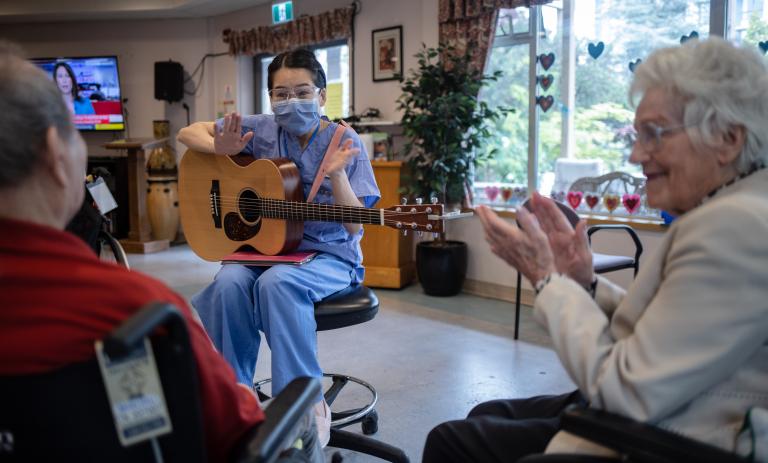Long-term care homes provide 24-hour professional care and supervision to adults in a supportive and secure environment. The services are available to people with complex care needs and physical and/or mental health conditions who cannot live safely and independently at home.
VCH long-term care homes
Download the information sheet for a complete list of long-term care homes. Included are brief details such as the home type, the number of subsidized and private pay beds, the room types and special unit types in the home.
-
Vancouver
- Adanac Park Lodge
- Arbutus Care Centre
- Banfield Pavilion - VGH
- Blenheim Lodge
- Braddan Private Hospital
- Broadway Lodge
- Casa Mia
- Central City Lodge
- Chénchenstway (Burnaby)
- Columbus Residence
- Dogwood Care Home
- Dr. Peter Aids Foundation Residence*
- Fair Haven Homes Society - Vancouver Lodge
- Finnish Home
- Oak Care Centre
- German Canadian Care Home
- Haro Park Centre
- Holy Family Hospital
- Kopernik Lodge
- Lakeview Care Centre
- Little Mountain Place
- Louis Brier Home and Hospital
- Mount St. Joseph Hospital (LTC)
- Point Grey Private Hospital
- Purdy Pavilion - UBC
- Renfrew Care Centre
- Royal Arch Masonic Home
- Royal Ascot Care Centre
- St. Jude's Anglican Home
- St. Vincent's: Brock Fahrni Pavilion
- St. Vincent's: Langara
- S.U.C.C.E.S.S. Simon K.Y. Lee Seniors Care Home
- Three Links Care Centre
- Villa Carital
- Villa Cathay Care Home
- Windermere Care Centre
- Yaletown House
- Youville Residence
-
Richmond
-
Coastal Urban
-
Coastal Rural
Considering long-term care
We believe the best quality of life is achieved by remaining in one’s own home environment for as long as possible. There are several health care and service options available in your home and community.
Learn more about supports available at home.
Long-term care is for adults with complex health care needs requiring 24-hour professional care due to physical disability, or mental or behavioural conditions, including brain injuries or dementia. Ultimately, access to long-term care services is based on a person’s assessed need and risk.
Getting started
Your first step is to contact your closest home and community care access line (also known as Central Intake). You will receive an assessment to determine whether you need support at home, a supportive living arrangement or placement in a long-term care home.
Frequently asked questions
-
Is there a cost for long-term care?
Publicly subsidized long-term care costs a monthly fee based on 80% of your after-tax income, with set minimum and maximum rates.
As long-term care is considered your home, you may be required to pay additional fees for services or items you would pay for living on your own. For example, there may be additional fees for things like equipment or aids, optional activities, and hairdressing services. You will be told about all fees before you move in.
-
If I am placed in an interim care home, how can I transfer to a preferred home?
Many people need to move into the first available long-term care home which may not be your preferred location. When this happens, you will remain on the waitlists for your preferred care homes. When an appropriate vacancy comes up at your preferred care home, you can accept the transfer, or you may decide that you want to stay where you are.
You may change your mind anytime if you want to stay at your current home.
-
What is the consent process?
Consent is required for admissions to long-term care homes. If an adult is not capable of providing consent, someone acting on their behalf will be asked to consent to a specific care home. Please visit the Ministry of Health website or speak with your health care provider for more information.
-
Who operates each long-term care home?
Homes fall into three categories:
- Homes that are owned and operated by a Health Authority (Vancouver Coastal Health or Providence Health Care). All rooms are publicly subsidized.
- Homes that are operated by providers that have contracts with VCH. These homes have publicly subsidized rooms.
- Homes that are fully private and not connected with VCH. No rooms are publicly subsidized.
Get involved
Resident and Family Councils amplify the voices of people living in long-term care. Council members are residents and family and caregivers who sometimes speak on behalf of residents. Learn more about Resident and Family Councils.
Resources
-
-
Introduction to Long-Term Care Handbook
-
Guide: Accessing Publicly Subsidized Long-Term Care Homes
-
Long-term care homes information sheet
One-pager sheet with brief details of each long-term care home.
-
Find this service near you
-
 Long term care homes
Long term care homesAdanac Park Lodge
851 Boundary Road Vancouver -
 Long term care homes
Long term care homesArbutus Care Centre
4505 Valley Drive Vancouver -
 Long term care homes
Long term care homesBerkley Care Centre
2444 Burr Place North Vancouver -
 Long term care homes
Long term care homesBlenheim Lodge
3263 Blenheim Street Vancouver -
 Long term care homes
Long term care homesBraddan Private Hospital
2450 West 2nd Avenue Vancouver -
 Long term care homes
Long term care homesBroadway Lodge
1377 Lamey's Mill Road Vancouver -
 Long term care homes
Long term care homesCasa Mia
1920 SW Marine Dr Vancouver -
 Long term care homes
Long term care homesCentral City Lodge
415 West Pender Street Vancouver -
 Long term care homes
Long term care homesChristenson Village
585 Shaw Road Gibsons -
 Long term care homes
Long term care homesChénchenstway
7550 Rosewood Street Burnaby -
 Long term care homes
Long term care homesColumbus Residence
704 West 69th Avenue Vancouver -
 Long term care homes
Long term care homesCreekstone Care Centre
1526 Oxford Street North Vancouver -
 Long term care homes
Long term care homesEvergreen House
231 East 15th Street, on the Lions Gate Hospital campus North Vancouver -
 Long term care homes
Long term care homesFair Haven Homes Society
2720 East 48th Avenue Vancouver -
 Long term care homes
Long term care homesFinnish Home
2288 Harrison Drive Vancouver -
 Long term care homes
Long term care homesFraserview Retirement Community
9580 Williams Road Richmond -
 Long term care homes
Long term care homesGerman Canadian Care Home
2010 Harrison Drive Vancouver -
 Long term care homes
Long term care homesHamilton Village Care Centre
23111 Garripie Avenue Richmond -
 Long term care homes
Long term care homesHaro Park Centre
1233 Haro Street Vancouver -
 Long term care homes
Long term care homesInglewood Care Centre
725 Inglewood Avenue West Vancouver -
 Long term care homes
Long term care homesKopernik Lodge
3150 Rosemont Drive Vancouver -
 Long term care homes
Long term care homesLakeview Care Centre
3490 Porter Street Vancouver -
 Long term care homes
Long term care homesLittle Mountain Place
330 East 36th Avenue Vancouver -

Long-Term Care at Evergreen Extended Care
4970 Joyce Avenue Powell River -
Long-Term Care at Banfield Pavilion
2785 Ash St. Vancouver -

Long-Term Care at Bella Coola General Hospital
1025 Elcho Street Bella Coola -

Long-Term Care at Cedarview Lodge
1200 Cedar Village Close North Vancouver -
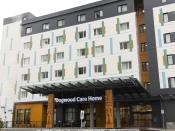
Long-Term Care at Dogwood Care Home
7405 Paulson St Vancouver -

Long-Term Care at Hilltop House
38146 Behrner Drive Squamish -

Long-Term Care at Holy Family Hospital
7801 Argyle St Vancouver -

Long-Term Care at Oak Care Centre
780 W 57th Avenue Vancouver -

Long-Term Care at Purdy Pavilion
2211 Wesbrook Mall Vancouver -

Long-Term Care at Richmond Lions Manor Bridgeport
9020 Bridgeport Road Richmond -

Long-Term Care at S.U.C.C.E.S.S. Simon K.Y. Lee Seniors Care Home
555 Carrall Street Vancouver -

Long-Term Care at Silverstone Care Centre
5625 Derby Road Sechelt -

Long-Term Care at Willingdon Creek Village Residence
4980 Kiwanis Avenue Powell River -

Long-Term Care at Youville Residence
4950 Heather Street Vancouver -
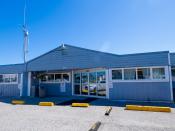
Long-Term Care at ƛ̓uxválásu̓ilas Heiltsuk Hospital
88 Waglisla Street Bella Bella -
 Long term care homes
Long term care homesLynn Valley Care Centre
1070 Lynn Valley Road North Vancouver -
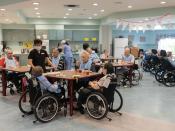 Long term care homes
Long term care homesMinoru Residence
7333 Gollner Avenue Richmond -
 Long term care homes
Long term care homesMount Saint Joseph Hospital (Long-Term Care)
3080 Prince Edward Street Vancouver -
 Long term care homes
Long term care homesPinegrove Place
11331 Mellis Drive Richmond -
 Long term care homes
Long term care homesPoint Grey Private Hospital
2423 Cornwall Avenue Vancouver -
 Long term care homes
Long term care homesRenfrew Care Centre
1880 Renfrew Street Vancouver -
 Long term care homes
Long term care homesRosewood Manor
6260 Blundell Road Richmond -
 Long term care homes
Long term care homesRoyal Arch Masonic Home
7850 Champlain Crescent Vancouver -
 Long term care homes
Long term care homesRoyal Ascot Care Centre
2455 East Broadway Vancouver -
 Long term care homes
Long term care homesSt. Jude's Anglican Home
810 West 27th Avenue Vancouver -
 Long term care homes
Long term care homesSt. Vincent's: Brock Fahrni
4500 Oak Street Vancouver -
 Long term care homes
Long term care homesSt. Vincent's: Langara
255 West 62nd Avenue Vancouver -
 Long term care homes
Long term care homesThe Louis Brier Home and Hospital
1055 West 41st Avenue Vancouver -
 Long term care homes
Long term care homesThree Links Care Centre
2934 East 22nd Avenue Vancouver -
 Long term care homes
Long term care homesVilla Carital
3050 Penticton Street Vancouver -
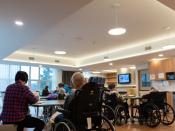 Long term care homes
Long term care homesVilla Cathay Care Home
970 Union Street Vancouver -
 Long term care homes
Long term care homesWindermere Care Centre
900 West 12th Avenue Vancouver -
 Long term care homes
Long term care homesYaletown House
1099 Cambie Street Vancouver


